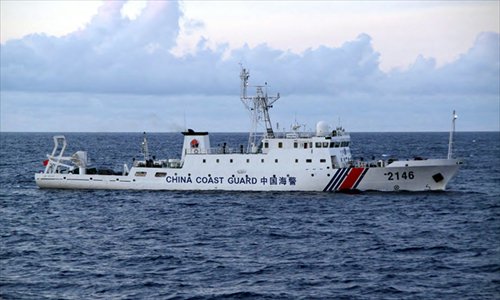HOME >> OP-ED
Advantage China in Diaoyu dispute
Source:Global Times Published: 2013-9-12 0:38:02

This handout picture taken and released by the Japan Coast Guard shows a China Coast Guard ship cruising near the Diaoyu Islands in the East China Sea on Thursday. Photo: AFP / Japan Coast Guard
Yesterday was the one year anniversary of Japan "nationalizing" the Diaoyu Islands. In the past year, China and Japan almost completely turned against each other because of these islands. The economic and political relationship between both nations has stagnated and even regressed.
To be honest, neither China nor Japan can regard it as a win-win situation. But it is also too arbitrary to judge that China and Japan are both losers in the last year.
Japan has failed in its effort to consolidate its actual control of the Diaoyu Islands. It did not only underestimate China's resolve to defend the integrity of its sovereignty, but miscalculated China's assertive response to its aggressive action.
By taking this opportunity, Chinese marine law enforcement expanded its forefront into the surrounding waters of the Diaoyu Islands, and established a regular system of law enforcement.
As China and Japan are undergoing their worst year in the last 40 years since the rapprochement, both sides have suffered losses.
But since Japan is becoming more dependent on China's economy, such a stalemate is wearing Japan's strategic stamina, which incurs more concerns for Japan.
Japan's right-wingers are the greatest beneficiary in this Sino-Japanese stalemate. Taking a rough stand against China helps Shinzo Abe's government win more votes, but considering the influence from the international community, ring-wingers alone are unable to realize "the normalization of Japan."
China has not only shaken Japan's effective control over the islands, but more importantly, it shows to the rest of the world its resolution to protect its sovereignty, both assertively and forcefully.
China has set its biggest goal of development as realizing a peaceful rise. But this single goal has been countered and contained by other powers, such as Japan and the US.
The Diaoyu Islands have already become the outlet where these powers voice their hostility and resentment against China. China has managed to control this outlet, and respond with effective action.
China's increasing economic prosperity and the popular support to China's Japan policy have qualified China to continue this stalemate if it is needed.
At the same time, this continued confrontation will make Japan more dependent on the US, which will only impose limited pressure on China.
This kind of "cold confrontation" will probably continue. But what really matters is that China has grasped the initiative. With unprecedented unity and confidence, China will make Japan's efforts to "encircle China" within ideologies and values in vain.
The current Japan policy has deepened China's understanding of diplomatic relations. The best diplomatic policy should be based on a domestic consensus, feasible in the long term, and in compliance with the international environment.
In the last year, Japan has drawn many lessons, while China has acquired more experience. So far, China has bested its neighbor on the issue.
Posted in: Editorial